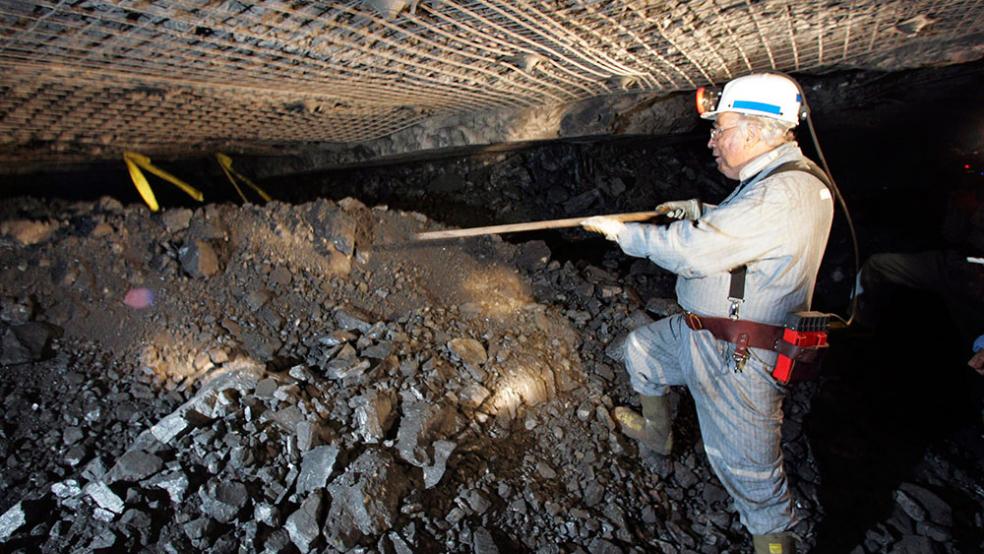President Obama’s push to restrict coal usage in the
Because China’s nuclear program is behind schedule, the Chinese are expected to import significant amounts of coal in the years ahead. The new EPA regulations promoted by Obama will make it cheaper for
Related: Democrats Inoculate Themselves Against Obama’s Coal Rule
Instead, President Obama could have used our energy bounty to respond to Putin’s numerous provocations with an all-out program to increase U.S. energy. He could have backed an “all of the above” strategy, reduced red tape by executive fiat, green-lighted the Keystone XL pipeline, fast-tracked nuclear development and approval for LNG exports – all intended to put Putin on notice that energy prices will not move higher anytime soon.
Putin desperately needs higher oil prices, to fund his adventures overseas and his promises of higher pay and benefits made to Russians and Crimeans alike. Russia’s growth has slowed, the government has promised to spend $48 billion building up Crimea, and foreign capital is leaving the country. With 70 percent of Russia’s exports and17 percent of the economy dependent on oil, an aggressive U.S. energy policy could have been a powerful weapon.
Instead of declaring a full-out program to boost domestic energy, we will now spend our great energy bounty to drive carbon emissions lower. Americans are being told this is an urgent need – with President Obama speciously linking carbon emissions with weather disasters and respiratory ailments. This program will be another unpopular, divisive quest by Mr. Obama to secure his legacy; instead it may become an anvil around the country’s neck.
Related: China Will Now Cap Its Own Co2 Emissions
The proposed new EPA regulations to reduce power plant carbon emissions will restrict our country’s energy options, leading to the closing of hundreds of coal-fired power plants, and the use of substantially more natural gas to meet the nations’ need for electricity. That trend, of course, is already underway. Cheap (and significantly cleaner) natural gas has gained market share from coal. As a result, emissions in the U.S. are already on the decline – a victory you don’t hear much about.
Between 2007 and 2012, greenhouse gas emissions in the U.S. dropped by nearly 11 percent. One idea would be to let this market-driven trend follow its constructive course, until circumstances change. It is possible that energy forecasters have been overly optimistic about natural gas resources freed up by fracking; some have detailed alarmingly steep decline curves for new wells produced in this manner. What if the pessimists prove right? We will not easily bring closed coal plants back on stream.
The
He says the Obama move to cut back on coal is “repeating bad history.” In 1978, the
Related: Obama Risks the U.S. Economy for a 1.8 Percent Reduction in Co2
Since 1973, according to Bryce, coal use around the world has expanded by 43.6 million barrels of oil equivalent per day. That compares to a jump of 39 mb/d of natural gas and 34 mb/d of oil.
Coal use is up in the U.K., Spain, France and Germany. But, the big user is China, where coal consumption has grown between 2002 and 2012 by about 23 mb/d – or about 2 ½ times the amount of coal burned in the
Yes, the Chinese are concerned about pollution, but so far, that anxiety has translated into locating coal plants far from congested cities, not banning the fuel’s use. In 2012,
Related: Obama Takes Aim at Power Plants to Slow Climate Change
Others have noted that even a 30 percent drop in
Some in the country will celebrate Mr. Obama’s war on coal; others, especially Democrats running for office in energy-producing states like Kentucky or West Virginia, are not so happy.
For Democrats nationally, the EPA rules feed the GOP narrative that job creation has always been a low priority for President Obama, even as it has been the top concern for the country. Perhaps aware that the new regulations are controversial, Mr. Obama allowed EPA head Lisa Jackson to unveil the anti-coal plan; it is rare that the president foregoes a Rose Garden photo-op.
President Obama will not take advantage of
Top Reads at The Fiscal Times:




